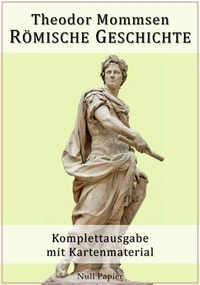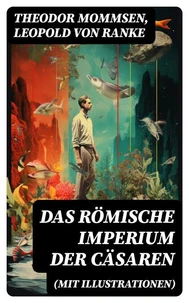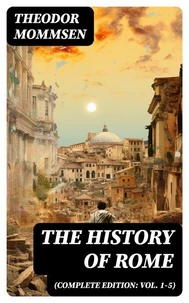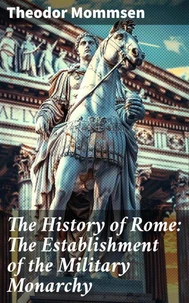The History of Rome: The Revolution. The Evolution of Ancient Rome: A Scholarly Exploration of Political Turmoil
Par : ,Formats :
Disponible dans votre compte client Decitre ou Furet du Nord dès validation de votre commande. Le format ePub est :
- Compatible avec une lecture sur My Vivlio (smartphone, tablette, ordinateur)
- Compatible avec une lecture sur liseuses Vivlio
- Pour les liseuses autres que Vivlio, vous devez utiliser le logiciel Adobe Digital Edition. Non compatible avec la lecture sur les liseuses Kindle, Remarkable et Sony
 , qui est-ce ?
, qui est-ce ?Notre partenaire de plateforme de lecture numérique où vous retrouverez l'ensemble de vos ebooks gratuitement
Pour en savoir plus sur nos ebooks, consultez notre aide en ligne ici
- Nombre de pages530
- FormatePub
- ISBN859-65--4750662-1
- EAN8596547506621
- Date de parution12/08/2023
- Protection num.Digital Watermarking
- Taille988 Ko
- Infos supplémentairesepub
- ÉditeurGOOD PRESS
Résumé
In "The History of Rome: The Revolution, " Theodor Mommsen delves into the complex socio-political transformations that shaped ancient Rome during its revolutionary era. Written in a neoclassical style, Mommsen's prose is both scholarly and engaging, inviting readers to explore the intricate interplay between power, governance, and the civic identity of Romans. Employing a chronological approach, he meticulously dissects pivotal events, such as the fall of the Roman Republic and the rise of autocratic rule, all while providing rich contextual analysis that examines the influences of contemporary moral philosophy and historical thought.
Theodor Mommsen, a distinguished German historian and Nobel laureate, approached this monumental work with a keen understanding of Roman law and history, drawing from his extensive scholarly background. His passion for the ancient world, combined with his experience in law and politics, fueled his examination of Rome's fundamental transformations. Mommsen's insights were further shaped by the 19th-century intellectual milieu, which emphasized the importance of civic virtue and the consequences of political change.
As a compelling read for historians and enthusiasts alike, "The History of Rome: The Revolution" offers not only an authoritative narrative but also an intellectual engagement with the lessons of history. Mommsen's rigorous analysis and eloquent style make this work a vital addition to any library, inviting readers to reflect on the enduring impact of Rome's revolutions on contemporary governance and societal structures.
Theodor Mommsen, a distinguished German historian and Nobel laureate, approached this monumental work with a keen understanding of Roman law and history, drawing from his extensive scholarly background. His passion for the ancient world, combined with his experience in law and politics, fueled his examination of Rome's fundamental transformations. Mommsen's insights were further shaped by the 19th-century intellectual milieu, which emphasized the importance of civic virtue and the consequences of political change.
As a compelling read for historians and enthusiasts alike, "The History of Rome: The Revolution" offers not only an authoritative narrative but also an intellectual engagement with the lessons of history. Mommsen's rigorous analysis and eloquent style make this work a vital addition to any library, inviting readers to reflect on the enduring impact of Rome's revolutions on contemporary governance and societal structures.
In "The History of Rome: The Revolution, " Theodor Mommsen delves into the complex socio-political transformations that shaped ancient Rome during its revolutionary era. Written in a neoclassical style, Mommsen's prose is both scholarly and engaging, inviting readers to explore the intricate interplay between power, governance, and the civic identity of Romans. Employing a chronological approach, he meticulously dissects pivotal events, such as the fall of the Roman Republic and the rise of autocratic rule, all while providing rich contextual analysis that examines the influences of contemporary moral philosophy and historical thought.
Theodor Mommsen, a distinguished German historian and Nobel laureate, approached this monumental work with a keen understanding of Roman law and history, drawing from his extensive scholarly background. His passion for the ancient world, combined with his experience in law and politics, fueled his examination of Rome's fundamental transformations. Mommsen's insights were further shaped by the 19th-century intellectual milieu, which emphasized the importance of civic virtue and the consequences of political change.
As a compelling read for historians and enthusiasts alike, "The History of Rome: The Revolution" offers not only an authoritative narrative but also an intellectual engagement with the lessons of history. Mommsen's rigorous analysis and eloquent style make this work a vital addition to any library, inviting readers to reflect on the enduring impact of Rome's revolutions on contemporary governance and societal structures.
Theodor Mommsen, a distinguished German historian and Nobel laureate, approached this monumental work with a keen understanding of Roman law and history, drawing from his extensive scholarly background. His passion for the ancient world, combined with his experience in law and politics, fueled his examination of Rome's fundamental transformations. Mommsen's insights were further shaped by the 19th-century intellectual milieu, which emphasized the importance of civic virtue and the consequences of political change.
As a compelling read for historians and enthusiasts alike, "The History of Rome: The Revolution" offers not only an authoritative narrative but also an intellectual engagement with the lessons of history. Mommsen's rigorous analysis and eloquent style make this work a vital addition to any library, inviting readers to reflect on the enduring impact of Rome's revolutions on contemporary governance and societal structures.








